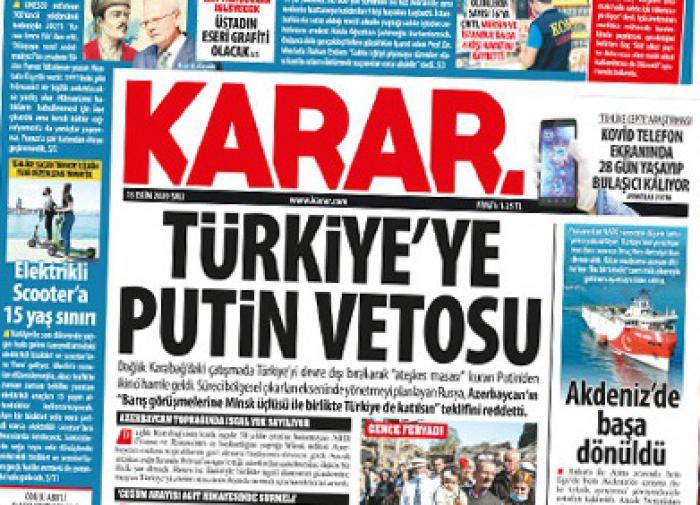Turkey explains Russia's unwillingness to let Turkey participate in the negotiation process regarding the resolution of the Nagorno-Karabakh crisis.

Putin vetoes Turkey's participation in the talks
On October 13, the Turkish newspaper Karar published a front page article under the headline "Putin's veto to Turkey." In the article, the newspaper said that Moscow rejected the idea of Turkey's participation in potential peace talks with co-chairs of the Minsk Group (Russia, France and the United States) regarding the Nagorno-Karabakh problem. The goal of opposing this idea, the newspaper said, is to make the negotiation process fit into "Russia's regional interests."
The Karar newspaper noted that the Minsk Group became active "only when the Azerbaijani troops started returning their lands," but "its calls for a ceasefire do not say anything about Yerevan's pullout from the occupied lands."
The newspaper emphasizes that Moscow actually supports Armenia in this conflict, because "while Yerevan was bombing the civilian population of Ganja", Lavrov (Sergei Lavrov - Russian Foreign Minister - ed.) was meeting his counterpart (Zohrab) Mnatsakanyan in Moscow, where they discussed the unwillingness of Nagorno-Karabakh to attract Turkey to negotiations."
Truce is not good for Azerbaijan
"Not a truce, but a break for armament," the headline of the Yeni Shafak newspaper reads regarding the ceasefire in Nagorno-Karabakh, which has become "a life-giving drop of water for the exhausted Armenian army."
According to the newspaper, the Armenians are taking advantage of the moment to strengthen their armed forces, while Russia, France, Iran and the United States are transferring high-tech weapons to Armenia.
The Yeni Safak publication pointed out that Russia allegedly handed over heavy weapons, Kornet anti-tank missile systems and Igla anti-aircraft missile systems to Armenia. Some of those arms systems had allegedly been delivered on board the aircraft of Armenian Foreign Minister Mnatsakanyan, who took part in ceasefire negotiations in Moscow.
Making a reference to the "authorities of Azerbaijan," the Yeni Safak wrote that France also sent military aid to Armenia during the truce. The transportation was carried out by passenger or VIP planes, because Georgia closed air and road routes for military purposes, the newspaper said.
"The Armenian diaspora in the United States was also sending military hardware under the guise of humanitarian aid," the newspaper said.
Russia wants to topple Nikol Pashinyan?
The Milliyet newspaper published an interview with the politician Mehmet Ali Bayar, who believes that Russia was behind a new aggravation in Nagorno-Karabakh, as Moscow needs to change power in Armenia. In his opinion, Prime Minister Nikol Pashinyan "is trying to get out of Russia's orbit of influence, to get closer to the West and the United States," which is unacceptable for Russia, as Armenia takes a strategically important position in the region of the Caucasus.
Ali Bayar believes that Pashinyan disgraced himself by "going on such an adventure." Therefore, the change of power will take place "today or tomorrow."
"There will be a coup ... Otherwise, I do not expect major advances that will help return Nagorno-Karabakh back to Azerbaijan," the politician said.
In his opinion, "a new front line is emerging" in favor of Azerbaijan, but the Russians will not allow progress "that would affect Armenia even more."
In the article titled "Russia: Competitor or Partner?" that was published in the same newspaper, columnist Sami Cohen wrote that in the conflict between Azerbaijan and Armenia, "Turkey actively supports Baku, while Moscow retains its principled position, which prioritizes its interests in Armenia, while taking care of the need for balanced policy." Turkey and Russia, despite the disagreements that have arisen in connection with the Nagorno-Karabakh crisis, can indeed work together, the author of the article believes.
"There is a possibility for 'subtle tuning' between the feuding positions. This requires will and dialogue between the leaders of the two countries, who are aware of their common interests," Sami Cohen wrote.
No comments :
Post a Comment